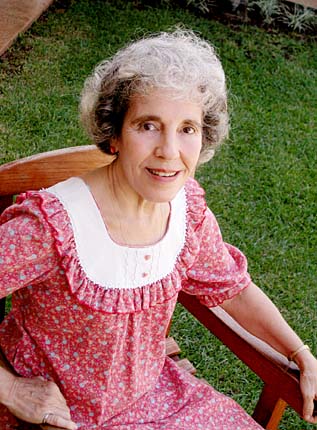
CRAIG T. KOJIMA / CKOJIMA@STARBULLETIN.COM
Ruth Freedman elected to undergo a mastectomy in summer 2000, then had her ovaries removed a year later when she realized she was at high risk for breast and ovarian cancer.
Pre-emptive surgery
A retired nurse has her breasts
and ovaries removed after her
twin sister develops tumors
Retired nurse Ruth Freedman decided to take preventative action when she realized she was at high risk for breast and ovarian cancer.
She had an elective mastectomy in the summer of 2000 after consulting with her doctors at Kaiser Permanente. The following summer, she had her ovaries removed.
Freedman, 66, came to Hawaii from Israel in 1979 and worked with patients at the Hansen's disease settlement at Kalaupapa, Molokai, until she retired in 1990.
When her twin sister had a mastectomy in 2000 for a breast tumor, she said, "I thought, 'It's definitely in our family.'"
She also was aware of studies showing Jewish women who inherit mutations of certain genes have an 82 percent lifetime risk of developing breast cancer and 23 to 54 percent risk of ovarian cancer.
Freedman said she began thinking about an elective mastectomy when she saw a television program about a woman who took such a step.
When she told her doctor about her twin sister's cancer, he agreed she was at "extremely high risk," she said. She asked about the possibility of a preventative mastectomy, thinking, "I didn't know if I could pay for it."
Because of her high-risk status, however, she said Kaiser did not charge for the mastectomy. She would have had to pay $1,500 out of pocket if she opted for breast reconstruction, but said, "All I wanted was safety."
She also consulted friends and other nurses, and one put her in touch with a specialist at the University of California-Irvine who asked her reasons for wanting elective surgery. "The doctor said I was choosing this for the right reasons."
Freedman said her sister's medical history was a "rare early warning system," and she feared what would happen if she let herself be talked out of preventative surgery and then had cancer.
"A greater fear than cancer was depression that I might have done something and didn't."
She said she had had regular mammograms and, about five years before the mastectomy, had a biopsy for something suspicious.
"It was negative, but it was also on my mind."
Kaiser also approved her request to have her ovaries removed in 2001 after her twin, Sally, in Texas, had an ovarian tumor.
A genetic test showed she has mutations, which studies have linked with increased breast and ovarian cancer risks in some Jewish women.
She said her proactive decision was "just in time" because the surgeons found she had advanced ovarian cancer. "It was just amazing. ... Certainly it proved a good step for Kaiser to do preventative surgery."
She had chemotherapy for one year for the ovarian cancer, which was no trouble for her, she said, "because the mental problem was nonexistent."
Freedman left Kalaupapa and moved to Honolulu in 1990 to care for her father, who had heart and kidney disease.
When he could no longer walk up three flights to her apartment, she placed him at One Kalakaua, a senior condominium. He was there for about 1 1/2 months before he died of complications from heart disease in June 1998 at age 96.
This stirred another health concern for Freedman. She went to a lecture about women and heart disease by Dr. Roger White, a cardiologist caring for her father at Straub Clinic & Hospital.
"Women are really fearful of dying of cancer, but four times as many women die of heart disease as of all forms of cancer of women combined," said White, now medical director of Holistica Hawaii, medical scanning facility at the Hilton Hawaiian Village.
Because of her father's experience, White said Freedman wanted to know if she had heart disease and went to him about three weeks ago for a heart scan.
"She didn't want to survive cancer just to pop off from a heart attack. As it turns out, she had a very good heart scan, no arteriosclerosis."
The test with an electron beam angiogram only takes about five minutes and is easier to do than an electrocardiogram, he said. "We have the results right away, and it's not equivocal. We look into the arteries. We either see there is a heart problem, or there is not."
He said it was very helpful for Freedman "because it shows she's now not only free of cancer, but of heart disease, so it gives her peace of mind and she keeps doing her angelic things in the community with her harp."
Freedman played the harp at Kalaupapa to encourage patients to sing and has provided "harp therapy" at various facilities on Oahu. She began playing the harp in One Kalakaua's skilled-care facility dining room when her father was there and has continued the service on Sundays for five years.
On Christmas Day she presents a free concert at City Hall as "Mrs. Santa."
